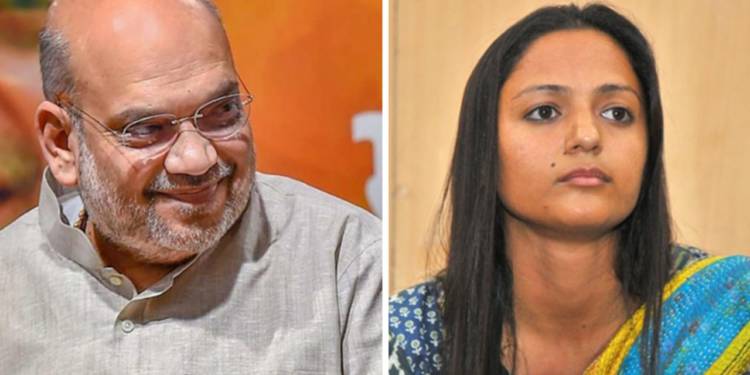EDIT: This article was originally published on 17th August 2019 wherein we said that Shehla Rashid’s political career is over. We stand vindicated as Shehla Rashid has already announced that she will be quitting electoral politics and she won’t be contesting block development council elections in Jammu and Kashmir.
…………………………………………………………………
A change in the status quo in Jammu and Kashmir has surely displeased established political parties and some new outfits mainly from the Kashmir valley, who have been ‘benefitting’ for long under the broken political system in Jammu and Kashmir. One such leader, who would not be able to reap the ‘benefits’ of the now diluted constitutional provision Article 370, is controversial politician Shehla Rashid.
As India explores the new paradigm after major political and strategic developments in the two newly created union territories, speculations over the new political developments are ripe with experts claiming that this change in political dynamics will not only give political rights to a large part of population residing in Jammu and Kashmir but will also pave way for young leaders from the grassroots to proactively contribute towards shaping the future of newly created union territories. However, the political narrative that suited Shehla Rashid is set to lose ground in Jammu and Kashmir, and therefore, this divisive leader’s political goals have met a tragic end.
As the vice-president of the Jawaharlal Nehru University Students’ Union (JNUSU), Shehla Rashid first caught the spotlight when she had voiced in favor of Kanhaiya Kumar, Umar Khalid and Anirban Bhattacharya who had allegedly raised slogans advocating division of India and in support of 2001 parliament attack mastermind Afzal guru. The pseudo-liberal media which was already fanning the flames in support of these few picked up Shehla Rashid and made her a poster girl for their ulterior agendas. What followed was Shehla Rashid transforming from a brainwashed and deluded Kashmiri youth to a known face in pseudo-liberals circles actively contributing to the same brainwashing which she herself was a victim to, her affiliation with the All India Students Association (AISA), which is the student wing of CPI(ML) also catalyzed her ascend.
Nonetheless, for Shehla Rashid the ground was fertile to build up support on basis of her identity and affiliations with left wing parties, however a number of controversies which followed the infamous JNU incident broke back of both the remaining credibility and relevance of Shehla Rashid in Indian political scene.
In November of 2018 serious allegations against activists for siphoning off the funds ment for the family of a rape victim had also surfaced, Shehla Rashid, who was one of the main activists to raise the money was also called out in this regard. The report published in the Tribune quotes the parents of the rape victim quoted the victim’s mother “The so-called social activists and politicians, who were in the forefront of the campaign seeking justice, brazenly exploited the brutality committed on my daughter and abandoned us after achieving petty personal goals.” She further added, “Except exploiting the incident for their personal goals, the so-called activists have done nothing to ensure justice to my daughter. We want exemplary punishment for those who committed the heinous crime.” The biological father of the girl had said, “Many people exploited the incident but were quick to abandon us.”Shehla Rashid was allegedly one of the main activists who “brazenly exploited the brutality committed”.
What followed were serious cases filed against the Shehla Rashid; In February 2019 Dehradun Police filed a FIR against Rashid for a tweet she posted on February 16, 2019, where she had written “15-20 Kashmiri girls trapped in a hostel in Dehradun for hours now. Mobs outside are baying for their blood. Police is present but unable to disperse the mob.” The FIR was filed under sections 504, 505 and 153b of the Indian Penal Code.
Nonetheless, with declining relevance of Communist parties in India, Shehla was also facing tough waters and had to look for other opportunities to remain relevant. Opportunity came in Jammu and Kashmir where controversial IAS officer Shah Faesal had launched a political outfit, Jammu & Kashmir People’s Movement (JKPM). Finally in March 2019 Shehla Rashid formally joined JKPM with the hope to boost her political career. Unfortunately for Shehla Rashid her political journey met shocking end after the Indian parliament moved ahead to scrap the divisive and biased constitution of Jammu and Kashmir and bifurcated the state of Jammu and Kashmir into two union territories.
Shehla Rashid was set to pursue a political career, as many Kashmir based political parties like PDP, NC and Shah Faesal (JKMP) derived their political steam from Article 370 and now with new political realities setting in, these parties who have for long exploited the people of Jammu, Kashmir and Ladakh will have to come in terms with equal electoral rights and equitable representation for scheduled castes and other minorities in Jammu and Kashmir.
Now, to the dismay of the likes of Shehla Rashid, as a Union territory under the Indian constitution, Jammu and Kashmir is set to have a legislative assembly which will be elected on more equitable grounds inclusive of those who have been kept out of local electoral processes. Major administrative powers of the state will rest with the Governor appointed by the President till the UT reaches to a security situation where it can again be converted to a full state. Jammu and Kashmir not having a single non- Kashmiri Muslim Chief Minister since its inception is also an indication of the skewed political tactics used to provide an edge to Kashmir centric political parties.
Shehla Rashid who rose to the limelight after supporting those accused of sedition to now meekly trying to benefit from the skewed and lopsided politics of Jammu and Kashmir has surely met her fate, however, it now remains to see if controversial leaders like Shehla Rashid join efforts to bring back normalcy to the region or continue with their ulterior agendas to destabilize peace in the region.




























